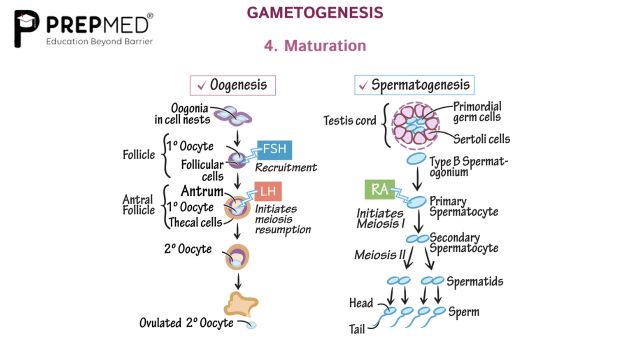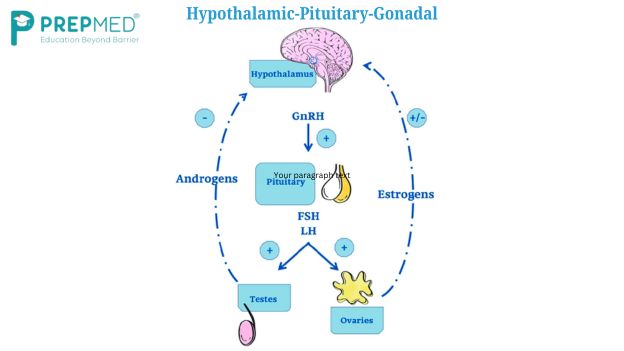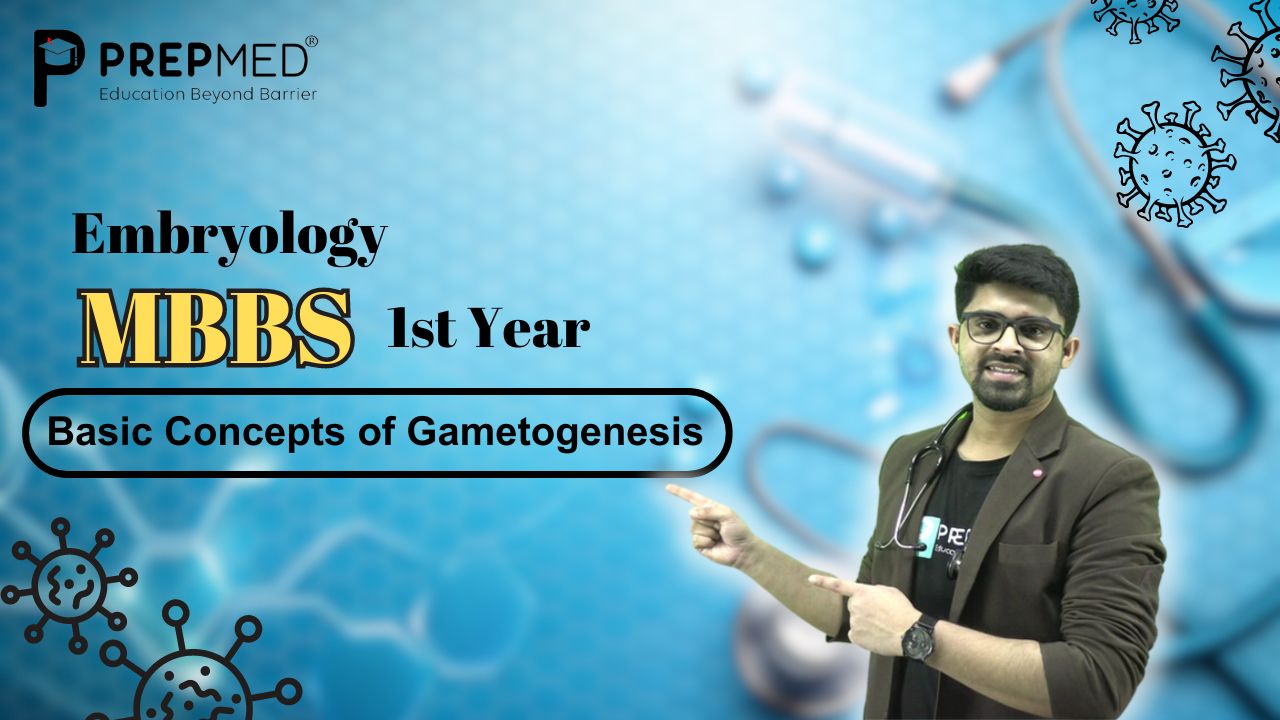September 20, 2024
Embryology MBBS 1st Year: Basic Concepts of Gametogenesis
An essential subfield of biology, embryology studies the development of embryos Knowing embryology is very essential in the framework of an MBBS program as it helps one to grasp human development, congenital abnormalities, and reproductive health. Gametogenesis, the mechanism by which gametes sperm and ova are generated is one of the basic ideas in embryology. The fundamental ideas of gametogenesis, its stages, and their importance in embryology will be covered on this site.
What is Gametogenesis?
Gametogenesis is the development and maturation of gametes under a sequence of intricate biological mechanisms. Human specialised organs for this include the testes for men and the ovaries for women. For MBBS students, a comprehension of the base of reproductive biology and developmental processes depends on an awareness of the fundamental ideas of gametogenesis.
Types of Gametogenesis

Gametogenesis may be mostly of two kinds:
Spermatogenesis is the male sperm-generating process.
Oogenesis is the female process of egg (ovum) production.
Spermogenesis
The seminiferous tubules of the testes undergo spersmatogenesis. One may break up the procedure into many phases:
Spermatogonial Phase:
This is the first phase in which diploid spermatogonia undergo mitosis to become main spermatocytes. Stem cells called spermatogonia copy to preserve the population, therefore guaranteeing a constant supply of cells for spermatogenesis.
Meiotic Phase:
Every main spermatocyte passes through meiosis I to generate two secondary spermatocytes; these then go through meiosis II to generate four haploid spermatids. A vital step in preserving genetic stability after fertilisation, this meiotic division halves the chromosome count.
Spermiogenesis:
Significant morphological changes accompany the transition of spermatids into mature spermatozoa: the nucleus condenses, the tail develops for motility, and the acrosome forms—all necessary for piercing the ovum.
Oogenesis:
Oogenesis occurs in the ovaries and consists of a diverse set of phases:
Like spermatogonia, oogonia are diploid cells that mitose to become primary oocytes. This period of foetal development results from the limited number of major oocytes girls inherit from their parents that lie dormant until adolescence.
Primary oocytes begin meiosis but are stopped in prophase I until ovulation. Every menstrual cycle could enable one main oocyte complete meiosis I to produce a polar body and a secondary oocyte. The one ovulated and able for fertilisation is the secondary oocyte.
After fertilisation, the secondary oocyte finishes meiosis II producing another polar body and a mature ovum. Restoring the diploid chromosome count and guarantees genetic diversity depend on this last stage.
Gametogenesis: Hormonal Control
Hormones control oogenesis as well as spermatogenesis. While luteinizing hormone (LH) and pituitary gland follicle-stimulating hormone (FSH) play important roles in men, testosterone is the main hormone causing spermatogenesis stimulation in guys.
For women to control their maturation of eggs and the menstrual cycle, oestrogen and progesterone are very vital. For MBBS students, who connect more broadly to ideas of reproductive health and reproduction, knowledge of these hormonal impacts is essential.
Purpose of the Hypothalamic-Pituitary-Gonadal Axis

Comprising a sophisticated network of hormone interactions, the hypothalamic-pituitary-gonadal (HPG) axis controls reproductive processes. The hypothalamus in men secretes gonadotropin-releasing hormone (GnRH), which stimulates the anterior pituitary to produce FSH and LH. LH increases testosterone production; FSH advances spermatogenesis.
GnRH increases LH and FSH in women, which act on the ovaries to encourage follicle formation and oestrogen synthesis. For MBBS students, knowing the HPG axis is crucial as it helps them to grasp the hormonal regulation of reproduction.
Importance of gametogenesis in embryology
Though fundamental in embryology, the concept of gametogenesis have important ramifications for clinical treatment as well. In gametogenesis, abnormalities may cause birth defects, genetic problems, and infertility among other reproductive illnesses. For example, difficulties with ovum maturation could influence female fertility; problems with sperm production might lead to male infertility.
Clinical Uses of Assisted Reproductive Technologies (ART)
Understanding processes like in vitro fertilisation (IVF), where the maturation and fertilisation of gametes are controlled to achieve pregnancy, depends on knowledge of gametogenesis. Successful results depend on an awareness of the gamete collecting and fertilisation times.
Knowing the gametogenesis processes helps one to have better understanding of genetic diseases and their transmission. Counselling couples on genetic risks and the consequences of genetic testing depends on this information.
Knowledge of gametogenesis helps one to better appreciate the ways in which various contraceptives techniques work and their effects on reproductive health. Hormonal contraceptives, for example, interfere with the usual hormonal signals controlling gametogenesis.
Some congenital abnormalities may result from gametogenesis gone wrong. For meiosis, for instance, nondisjunction may cause aneuploidy—a disorder including Down syndrome. Knowing the fundamental ideas of gametogenesis assists doctors in spotting any hazards during prenatal treatment.
Gametogenesis and reproductive health
Dealing with reproductive health problems also depends much on a knowledge of the fundamental concept of gametogenesis. Gametogenesis may be disrupted by disorders such male hypogonadism and polycystic ovarian syndrome (PCOS), therefore causing problems with fertility. Managing these disorders and enhancing reproductive results depend critically on early diagnosis and action.
Future Directions and Research
There are great opportunities for knowledge of gametogenesis at the molecular level as embryology's study develops. Improved fertility therapies and a greater knowledge of congenital diseases may one day be made possible by developments in reproductive technology, stem cell research, and genetic engineering. As these advancements will significantly affect the direction of reproductive medicine going forward, MBBS students should keep informed on them.
In summary,
All things considered, the MBBS course includes embryology especially the concepts of gametogenesis into everyday instruction. Future doctors who have a strong understanding of these ideas will have the skills they need to handle reproductive health problems, comprehend developmental abnormalities, and use their expertise in clinical environments. Knowing gametogenesis helps one to approach prenatal care, genetic counselling, and reproductive therapies holistically.
The fundamental understanding of concepts of gametogenesis will act as a stepping stone for more complex subjects in embryology and reproductive biology as students develop in their studies. Resources like PrepMed may provide anyone wishing to improve their medical education and broaden their knowledge with insightful analysis and help.
Understanding the fundamental concepts of gametogenesis helps MBBS students to realise the complex mechanisms behind human existence and opens the path for a profession committed to advance of knowledge and health.
For more details on PrepMed and to find the nearest coaching center, visit PrepMed’s official website
Follow Us - on Facebook /Instagram/ YouTube






